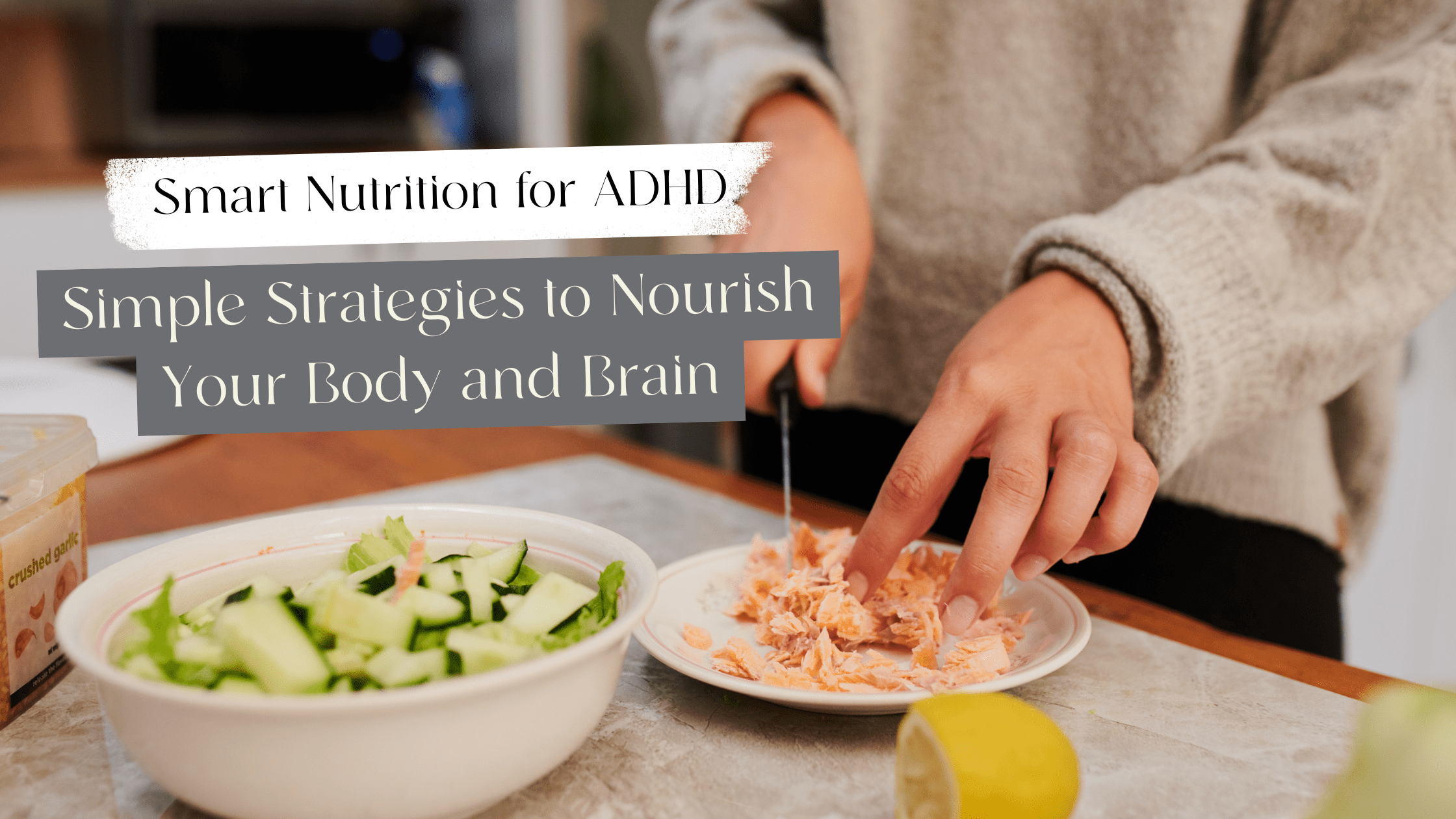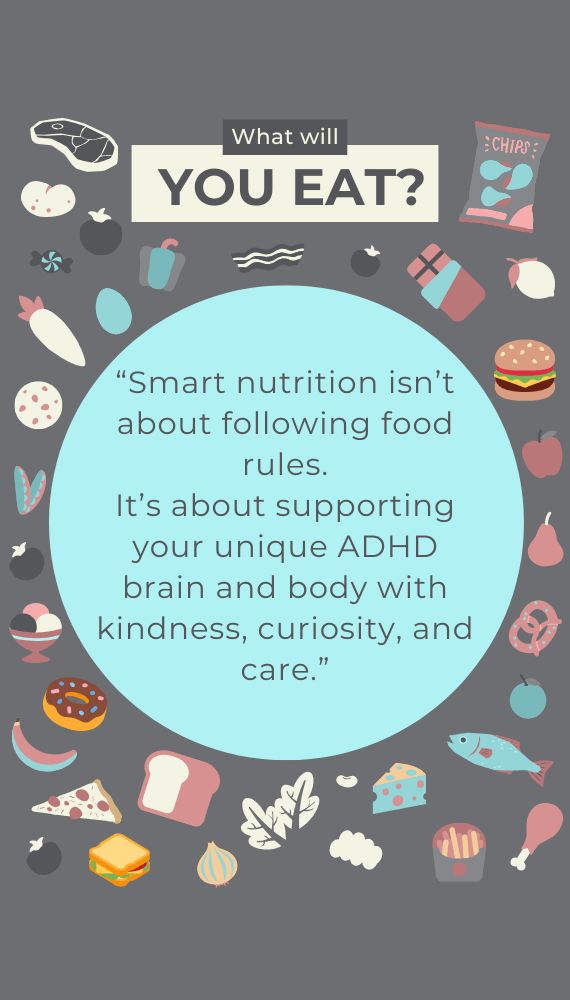
It won’t surprise you, but there are some common everyday life challenges across the ADHD community. One of them is feeding ourselves! Given all the planning, sensory, allergy, energy and time obstacles, it’s no wonder this pops up more often than not. So come with me as I chat about smart nutrition for ADHD with all-round lovely person and qualified Naturopath, Jodie Studley from Cherish Natural Health.
How, when, and what you eat can play a crucial role in managing symptoms and improving your overall well-being.
Jodie shared some incredible insights on how to bridge the gap between conventional medicine and holistic health through the power of food.
And I’ll show you the simple strategies that can work with your beautiful ADHD brain to nourish your body.
Jodie is a strong advocate for taking charge of our own health, emphasising that there’s a great deal we can do at home to support ourselves, especially when it comes to nutrition.
Smart nutrition isn’t just about adhering to the “shoulds” we all place on ourselves regarding food. It is supportive in managing ADHD symptoms and boosting your overall health. It’s about empowering yourself through nourishing your whole being!
What is your body is trying to tell you? Jodie recommends combining pathology and functional medicine to decode those messages. By examining factors such as blood pathology, hair analysis, and stool analysis, you can gain a clear understanding of your individual health needs.
From this, a truly personalised health plan is created, identifying any nutritional deficiencies and helping you optimise your health from the inside out. It’s like having a roadmap with all the shortcuts to what will make the biggest impact on your health!
When it comes to building a balanced diet for ADHD, Jodie stresses the importance of whole foods and ditching those processed culprits that can lead to inflammation and gut issues, which we know are such a common occurrence for any neurodivergent folks.
Her advice emphasises the importance of variety and ensuring your body receives all the necessary nutrients.
Here’s Jodie’s “handy” way of what to aim for:
Jodie has been wonderfully generous and provided us with her handy handout, “Healthy Balanced Meals,” which you can download.

For many living with ADHD, sensory sensitivities and allergies can throw a curveball into dietary choices. Jodie’s advice here is straightforward: stick to whole foods and steer clear of processed foods packed with artificial additives.
She also highlights the importance of trying to identify and eliminate specific allergens that might be triggering symptoms. Listening to your body is key here!
If you’re feeling that feeding yourself is hard, you’re probably not imagining it. Navigating intolerances, allergies, and inflammatory sensitivities adds complexity to eliminating foods or finding foods that don’t trigger a reaction.
During some research, I discovered there are reported links between allergy and neurodevelopmental differences such as ADHD. Immune dysregulation and inflammation are typical hallmarks in both allergic and neurodevelopmental disorders.
So getting a clear picture of what your body needs and can work with well could reduce this complexity and struggle.
While food is the preferred source of nutrients, we must acknowledge that supplements can play a role in addressing specific nutritional deficiencies.
This could be especially true if you’re at a point where you can’t get all the food you need, whether that’s due to sensory issues, allergies, a lack of time or energy to plan, or even getting to the supermarket.
However, the emphasis is on being cautious. Please make sure any supplements you take are bioavailable (meaning your body can actually use them) and genuinely necessary for your health needs.
Always, always, consult with a healthcare professional before starting any new supplement regimen!
For more research, you may want to read this paper, “Nutrition in the Management of ADHD.”
We know managing meal times can feel like a big task, especially with the executive function challenges that often come with ADHD. But let’s look at some practical tips to make healthier eating easier:

Adding some smart nutrition for ADHD can boost your overall health and well-being. By focusing on whole, nourishing foods, understanding your individual health needs, and implementing these practical strategies, you can absolutely take charge of nourishing your mind and body.
Remember, the best approach is always a personalised one, so don’t hesitate to consult with healthcare professionals to create a nutrition plan that works best for you.
Jodie and I would love to hear your questions or things that have worked for you. Please comment below, and we’ll be in touch.
Speak with Jodie and learn more at Cherish Natural Health.
Disclaimer: This is general information only and does not constitute a replacement for medical advice.
Sources:
Chua RXY, Tay MJY, Ooi DSQ, Siah KTH, Tham EH, Shek LP, Meaney MJ, Broekman BFP, Loo EXL. Understanding the Link Between Allergy and Neurodevelopmental Disorders: A Current Review of Factors and Mechanisms. Front Neurol. 2021 Feb 15;11:603571. doi: 10.3389/fneur.2020.603571. PMID: 33658968; PMCID: PMC7917177.
Lange KW, Lange KM, Nakamura Y, Reissmann A. Nutrition in the Management of ADHD: A Review of Recent Research. Curr Nutr Rep. 2023 Sep;12(3):383-394. doi: 10.1007/s13668-023-00487-8. Epub 2023 Jul 28. PMID: 37505402; PMCID: PMC10444659.
With Infinite Peace and Gratitude from,